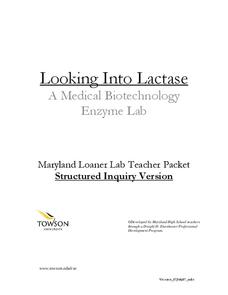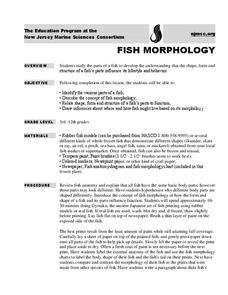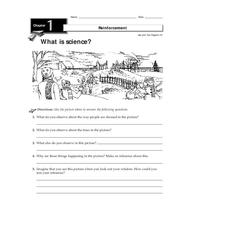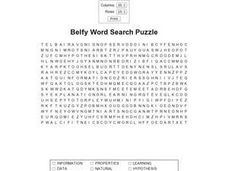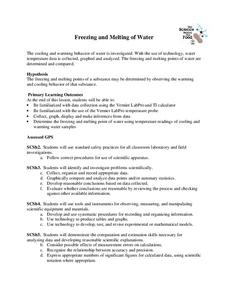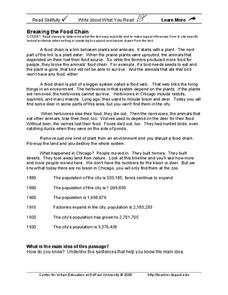Curated OER
Observation and Inference
Assess your young scientists' understanding of the difference between observation and inference with this 20-question multiple choice quiz. It reviews a variety of physics and astronomy concepts, such as solar eclipses and sunspots, the...
Curated OER
The Scientific Method
In this scientific method activity, students complete a crossword puzzle given 21 clues about the steps of the scientific method. Topics include observations, hypotheses, variables, inferences, results and conclusions.
Curated OER
Process Skills Review: Observation, Inference, and Predictions
A simple worksheet asks science learners to define five terms and identify five statements as predictions, observations, or inferences. This would be a supportive assignment when introducing elementary-levle scientist to inquiry practices.
University of Georgia
Energy Content of Foods
Why do athletes load up on carbohydrates the evening before a competition? The lesson helps answer this question as it relates the type of food to the amount of energy it contains. After a discussion, scholars perform an experiment...
Cherry Creek Schools
Physical Science Final Exam Review Packet
If you need a way to assess the concepts in your physical science class, use an extended set of worksheets as a midterm or final exam. It includes questions about density, physical and chemical matter, speed and velocity, weight and...
Towson University
Mystery Tubes
How do scientists know they're right? Truth be told, they don't always know. Explore the scientific process using mystery tubes in an insightful activity. Young scientists discover how to approach and solve problems in science, how ideas...
NASA
The Discovery of Jupiter Radio Waves
Lead your class on a journey to the planet Jupiter and provide them with fun facts in the process. Learners explore radio waves emitted by Jupiter to further understand how this data helps our daily lives. They conclude by discussing...
Towson University
Looking Into Lactase: Guided Inquiry
Milk does a body good ... unless, of course, someone is lactose intolerant. Pupils play the role of pharmaceutical scientists in a guided inquiry lab about lactase. Lab groups collaborate to learn more about lactose intolerance, how...
Towson University
The Wildlife Forensics Lab
Can science put an end to the poaching of endangered species? Show your young forensic experts how biotechnology can help save wildlife through an exciting electrophoresis lab. Grouped pupils analyze shark DNA to determine if it came...
Towson University
Looking Into Lactase: Structured Inquiry
Why is lactase important? Biology scholars explore enzyme function in a structured inquiry lab. The activity tasks lab groups with observing how temperature and pH affect enzyme activity, as well as determining which milk products...
UAF Geophysical Institute
System Interactions: The Lorax and the Truffula Tree
If the Lorax were to write a letter, what would he write? Introduce your class to systems and feedback loops through the whimsical stylings of Dr. Seuss. Learners take on the Lorax's point of view to write a letter, among other activities.
Consortium for Ocean Science Exploration and Engagement (COSEE)
Fish Morphology
Life comes in all different shapes and sizes, and fish are no exception. Here, young scientists create fish prints as they learn how specific characteristics allow different species to survive in their particular habitats.
Curated OER
What is Science?
In this scientific observations worksheet, students study an illustration and then complete 5 short answer questions about what they observe happening in the picture.
Curated OER
Belfy Word Search
In this language arts worksheet, students study 20 words in a word bank, then locate them in a word search puzzle. The words appear to be related to chemistry but the meaning of the title is not known.
University of Texas
Matter and the Periodic Table Chemical Families and Periodic Trends
Is assembling the periodic table as simple as Tetris? Scholars arrange colored cards into a logical order and then make connections to the arrangement of the periodic table. Hands-on activities include adding trend arrows and analyzing...
University of Georgia
Freezing and Melting of Water
Examine the behavior of energy as water freezes and melts. An engaging activity provides a hands-on experience to learners. Collaborative groups collect data and analyze the graphs of the temperature of water as it freezes and then...
DePaul University
Breaking the Food Chain
Throughout history, the growth of big cities has resulted in the destruction of ecosystems. In the case of Chicago, IL, a grassland that was once home to bison, deer, wolves, and foxes quickly became a booming city of over three million...
Curated OER
Desert Adaptations
In this desert adaptations worksheet, students are given a water filled sponge which represents an animal. Students observe their "animal" for a 24 hour period and conserve the water in the sponge as best they can. They measure and...
Curated OER
Doing a Lab Write Up
In this science worksheet, middle schoolers examine the topic in order to solidify knowledge covered in the curriculum using puzzles and creative games.
Curated OER
Light Stick Chemistry
In this descriptive investigation worksheet, 6th graders conduct an investigation to determine if heat energy affects the brightness of a light stick. The students will form a prediction, collect data and answer 3 conclusion questions.
Curated OER
Thinking Objectively
In this objective thinking worksheet, student practice thinking objectively when observing information. They summarize two paragraphs. One they summarize in an objective manner and the other is summarized in a subjective manner.
Curated OER
Resources
In this resources worksheet, students review renewable and nonrenewable resources. Students also review how resources can be conserved. This worksheet has 7 terms in a crossword puzzle, 3 true or false, and 10 short answer questions.
Curated OER
Force: Push and Pull
In this force instructional activity, students answer short answer questions about pushing and pulling different objects. Students complete 15 questions.
Other popular searches
- Teaching Inference Skills
- Inference Skills First Grade
- Reading Inference Skills
- Powerpoint Inference Skills
- Inference Skills in Reading
- Inference Skills Worksheet
- Science Inference Skills
- Inference Skills Sixth Grade









